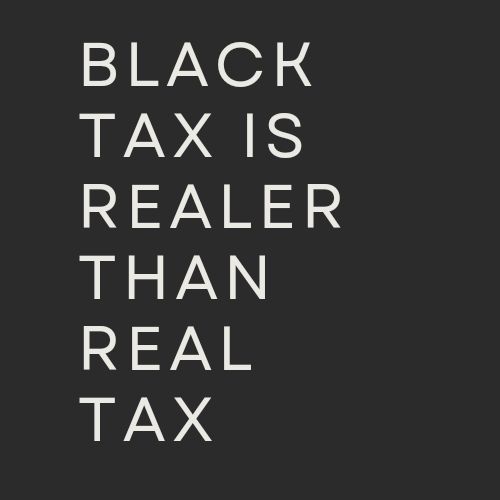Ever heard Black Tax anywhere and wondered what people are talking about? If not, let me break it down for you and if you’re already familiar or living it on a regular, how are you coping?
In the last two days I was faced with supporting two family members on financial needs I am unable to say no to. The first is from a close family member who just relocated to the UK and is offered a 20% discount if they are able to pay their outstanding school fees in 14 days. The second is another close family member who is dealing with an illness and getting medical treatment out of our home country. These are unplanned expenses I need to deal with and the base expectation is that I support in some form irrespective of my financial situation.
My first ah ha on black tax was when I started tracking my expenses last year and realised most of the money I spend is not on me. I was spending more on gifting (this was my catchall for everything I give out) every month than on myself. Some months were trickles and others were a huge chunk of my income.
What is Black Tax?
Black tax refers to the financial obligations or responsibilities that individuals from Black or historically disadvantaged communities may have towards their extended families. This can involve providing financial support to family members who are in need, often due to economic challenges. Black Tax highlights the additional financial burden that people like me face because of societal and historical inequalities, where they feel a responsibility to support their extended families.
I have classified the people who ask for my support into two groups. Group one are those who ask for one off support that are usually substantial either for medical support or school needs. And group two are those who have literally turned you into their personal ATM as they ask for regular small amounts that add up fast and they are pretty good at targeting your pay date.
How to plan for Black Tax:
- Set an annual budget for it and make it part of your budget
- Create a sinking fund and spread out your budgeted amount into equal monthly payments. Whether you get an ask or not, put the money aside every month
- Whenever you get an ask you can’t say No to, disburse it from the sinking fund. Be strict in your disbursement by setting a maximum spend per ask
- If you can, do not provide 100% of the requested amount. People are like algorithms after all, if you always provide 100% of what is requested you have trained them to always expect it. So gradually wean yourself off the obligation to be the sole provider and if you struggle with this, imagine that you die or you are jobless, will the individual requesting your money not seek it from alternative sources?
- Try not to exceed what is budgeted for this per month or what’s available in your sinking fund
While Black Tax is now slightly acknowledged as a phenomenon that exists, what most people living the experience don’t talk about is Black Tax burnout which takes an immense toll on the individuals. One key driver of this is it feels like there is no end to this obligation. It is an endless stream of financial spending that you have no control over and you are always expected to cover for it.
Dealing with Black tax burnout:
- Work on yourself. This is difficult, very difficult as you feel a heavy guilt for your economic status and the need to pull everyone up. Some people also take advantage of this. If you’re in therapy, take this to your therapist as well
- Have a plan for every euro. In the past I’d just have money available in my account which meant whenever anyone reached out or called my brain will tell me I do have money available to support and I could never control myself even if I tried. I’d find me transferring without deep thinking. To stop this I started fully planning for every euro and had no cash available in my account except what I budgeted for the month
- Proactively share that you don’t have money. I do not do this myself but one thing my Mum has started doing is telling family members that my cost of living has skyrocketed since I had my child and I hardly have any money these days. They do give her the side eye but she’s adamant on the campaign to protect my wallet which I have to admit is working. The number of requests have dropped and I even have some people admitting how difficult it must be for me to deal with living far from family with no help. Phewww
I am still a work in progress on managing Black Tax but determined to be more balanced in how I approach it. For those who live this experience, do share any tools you use to cope and manage it better. I close with my new quote “Black Tax is realer than real tax”
